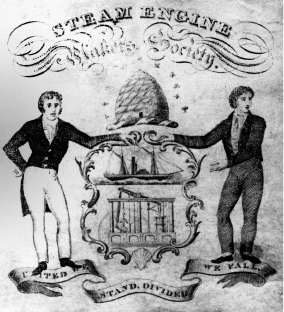Related Research Articles

The Amalgamated Engineering Union (AEU) was a major British trade union. It merged with the Electrical, Electronic, Telecommunications and Plumbing Union to form the Amalgamated Engineering and Electrical Union in 1992.
The National Amalgamated Union of Enginemen, Firemen, Mechanics, Motormen and Electrical Workers was a trade union in the United Kingdom. It represented stationary engine drivers and cranemen in a wide variety of industries, as well as less skilled workers in the electrical industry and miscellaneous workers.
The United Fishermen's Union was a trade union in the United Kingdom.
The Cardroom Amalgamation or Cardroom Workers' Amalgamation (CWA) was a British trade union which existed between 1886 and 1974. It represented workers in the cotton textile industry.
The Amalgamated Society of Engineers (ASE) was a major British trade union, representing factory workers and mechanics.

William Allan was a British trade unionist.
Robert Austin was a British trade unionist.
The National Union of Furniture Trade Operatives (NUFTO) was a trade union in the United Kingdom representing furniture makers.
The Amalgamated Union of Cabinet Makers (AUCM) was a trade union representing workers in furniture manufacturing in the United Kingdom.
The Amalgamated Society of Tailors and Tailoresses (AST&T) was a trade union representing tailors in the United Kingdom.
William Newton was a British trade unionist, journalist and Chartist.

The Steam Engine Makers' Society (SEM) was an early trade union representing engineers in the United Kingdom.
The Amalgamated Society of General Tool Makers, Engineers and Machinists, often known as the Amalgamated Toolmakers, was a trade union representing factory workers in the United Kingdom.
The Amalgamated Society of Core Makers of Great Britain and Ireland (ASC) was a trade union representing foundry workers in the United Kingdom.
The National Amalgamated Association of Tin Plate Workers of Great Britain was a trade union representing sheet metal workers in the United Kingdom.
The Amalgamated Society of Enginemen, Cranemen and Firemen was a trade union in the United Kingdom. It represented stationary engine drivers and cranemen in a wide variety of industries.
The Amalgamated Instrument Makers' Society was a trade union representing workers involved in manufacturing scientific instruments in the United Kingdom.
The National Society of Street Masons, Paviors and Road Makers was a trade union representing pavers in the United Kingdom.
The United Operative Spindle and Flyer Makers' Trade and Friendly Society was a trade union representing workers involved in making textile machinery in the United Kingdom.
The Amalgamated Society of Coopers was a trade union representing coopers in the United Kingdom and Ireland.